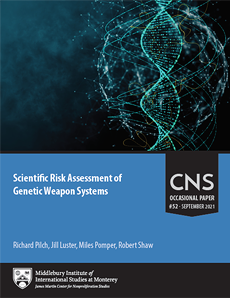Richard Pilch, Jill Luster, Miles Pomper, Robert Shaw
Source Link

For any emerging technology, defense and homeland security analysts strive to understand (1) its dual-use potential, meaning whether the same research and technology applied for peaceful purposes may be diverted to illicit ends, for example to develop a weapon; (2) the State and sub-State actors with access to that dual-use potential, whether peacefully or illicitly directed; and (3) motivational factors and indicators of intent that might suggest these actors would divert the emerging technology to illicit ends. Precision medicine represents one such emerging technical space. Precision medicine is defined as medical care designed to optimize benefit for particular groups, especially based on genetic (or molecular) profiling. A long-speculated but incompletely understood dual-use consideration of precision medicine is the possible development of a genetic weapon system, defined as a weapon system designed to optimize effect on particular groups based on genetic profiling.
This Occasional Paper assesses the potential for precision medicine to be diverted to develop a population-specific genetic weapon system, examines relevant state capabilities and motivations to pursue such an effort, and offers policy recommendations to manage the dual-use implications of this emerging biomedical field while still preserving its potential benefit for human welfare.
About the Authors
Richard Pilch
Dr. Richard Pilch is a non-resident fellow with the James Martin Center for Nonproliferation Studies (CNS) at the Middlebury Institute of International Studies (MIIS), and during 2019-2021 served as director of the Center’s Chemical and Biological Weapons Nonproliferation Programs. A physician by training, Dr. Pilch has focused on national security issues since 9/11 and the “anthrax letter” attacks of 2001. In 2002, he completed a postdoctoral fellowship in chemical and biological weapons nonproliferation at CNS, after which he spent nearly a decade overseas assessing and addressing biological warfare (BW), bioterrorism, and public-health emergencies of international concern, including threats posed by the former Soviet Union’s (FSU) legacy offensive BW program. He has performed onsite assessments of every known civilian BW facility in Russia, delivered thousands of man-hours of training to former Soviet scientists spanning nonproliferation, bioethics, and global health security, and planned and implemented dozens of cooperative research projects and pandemic response exercises across the FSU. Dr. Pilch has led multiple threat-reduction programs on behalf of the US government, served on over thirty technical panels and advisory boards, and authored more than sixty technical publications and White Papers. He co-edited the definitive Encyclopedia of Bioterrorism Defense (Wiley) with his longtime mentor, Dr. Raymond Zilinskas, in 2005.
Jill Luster
As a senior research associate for CNS, Jill Luster supported multiple projects related to nonproliferation, machine learning, One Health security, and biological security and safety.
She previously led a team of researchers in support of the Department of State’s Office of Cooperative Threat Reduction. Prior to joining CNS in 2018, Jill Luster developed extensive experience supporting a wide range of US government and Department of Defense missions assessing WMD programs with a focus on Iran, dual-use commodity proliferation, and commercial sector vulnerabilities to illicit acquisition. She has worked across nonproliferation offices supporting WMD terrorism and defense engagement and threat-reduction activities. Ms. Luster mentored junior analysts and led an issue-oriented team as a senior analyst.
She holds a Master of Science in Biohazardous Threat Agents and Emerging Infectious Diseases from Georgetown University and a Bachelor of Arts in International Relations and German from The College of William and Mary.
Miles Pomper
Miles Pomper is a senior fellow in the Washington, DC, office of CNS. His work focuses on nuclear energy, nuclear nonproliferation, nuclear security, and nuclear-arms control. He holds a Master’s degree in international affairs from Columbia University and a Master’s degree in journalism from Northwestern University.
Before joining CNS, he served as editor-in-chief of Arms Control Today from 2003–09. Previously, he was the lead foreign policy reporter for CQ Weekly and Legi-Slate News Service, where he covered the full range of national security issues before Congress, and served as a Foreign Service Officer with the US Information Agency.
Robert Shaw
Mr. Robert Shaw is the Director of the Export Control and Nonproliferation Program for the Middlebury Institute of International Studies (MIIS) at Monterey’s James Martin Center for Nonproliferation Studies (CNS). His research interests include strategic trade controls and their relationship with emerging dual-use technologies and the role of industry and the private sector in efforts to counter illicit WMD related trafficking and supply chain networks.
Prior to joining CNS in 2010, Mr. Shaw worked for over a decade in the private-sector, specializing in export control and international supply chain management. This included tenure as a senior manager with Toshiba America, Inc.’s Procurement & Export Division, where he was responsible for the development, implementation and oversight of the division’s internal export compliance program.
No comments:
Post a Comment